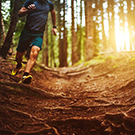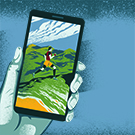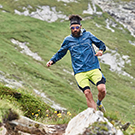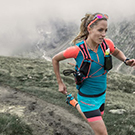Beginnerís guide to trail running
Whether you’re new to running, or you’re simply yet to stray from the concrete comfort of the road, the idea of getting off the beaten track – into a world of mud, hills, roots and the odd cow – can be an intimidating one. That’s understandable, but also easy to overcome. Because ask any trail runner to summarise their off-road experiences and the answer is likely to be a variation of one word: fun. That said, before you take to the trail there are a few things to bear in mind…
Trail-safe procedures
For many runners, trail is simply more exciting than road: there’s more variety, more freedom, more space. Yet those factors also necessitate slightly more prep, and a bit more pre-run thought, before you lace up your shoes and head out the door.
“When you’re on the trails, you’re far more likely to need to be self-sufficient, so you need to think about carrying some water, some food, and maybe some emergency clothing,” says running coach Karen Weir (runwithkaren.com). It’s also worth packing a hat, gloves and emergency jacket just in case something goes wrong. “Even if you’re running somewhere like the Surrey Hills,” says Weir, “you’re not going to be immediately accessible like you would be when running on road, so you need to be prepared.”
As for your clothes, whatever you usually run in will be fine, although you might want to consider trail-specific socks with slightly more padding, as the uneven terrain will move your feet around a bit more – something like the Drymax Trail Running Socks will help keep blisters at bay.
Try running in your usual running shoes, however, and you’re likely to come unstuck – or stuck, depending on the mud. Trail shoes are designed specifically to cope with the lumpy, sticky, loose terrain you might encounter on your off-road outing; road shoes are not. “In wet and muddy conditions you’re going to need a shoe with plenty of grip,” advises mountain runner Natalie White (@natsmountain). The ‘right’ shoe is a very subjective thing, but you’re going to want grip, comfort and durability. Head to your local running store to find the best trainer to fit your style and needs.
Clear the air
So you’ve got the kit and you’ve done the prep, now it’s time to enjoy the many benefits that trail running can bring. According to research in Proceedings of the National Academy of Sciences, 90 minutes spent in nature reduces stress and negative brain activity. How? For White, the answer is obvious: “You get to venture into the countryside, through forests, up and down hills, and you get the chance to see some magical views.”
That ‘magical’ element is also what draws Rachel Sheldrake – We Run Coach for Newark, Nottingham and the surrounding areas (we-run.co.uk) – to the trail. “I love the excitement of not knowing exactly what I’m going to see round the next corner or over the next hill,” she says. “Whether it’s hares dancing in a field or a rainbow appearing over the mountainside, the sights and sounds can be quite magical indeed.”
Mindset matters
Trail running has the power to refresh and de-stress, but to get the mental benefits, post-run, requires the right mentality beforehand. Unlike road running, a ‘good’ trail run is almost impossible to define by stats or times. As a result, it’s worth forgetting about those things altogether.
“You can run the same route on different days and it might feel like a completely different run,” says Sheldrake. “The conditions underfoot and the weather will be out of your control, so comparing times becomes meaningless. Learn to run to feel and don’t worry about what your watch is telling you. In fact, try leaving your watch at home every now and then.”
Race ready
Once you’ve built up your confidence and strength for trail running, you might want to consider entering a race. That can seem a scary prospect for the uninitiated, but if you’re imagining short-shorted speedsters jostling for position on a crowded start line, you’ll be pleasantly surprised by the reality of many off-road events. “The camaraderie in trail races is usually superb!” says Sheldrake.
Races are also an excellent way to measure your progression. “The route will be marked out for you, so you don’t need to worry about which way to go,” continues Sheldrake, “and you’ll have a whole host of other lovely trail runners to keep you company and motivate you to get to the end.”




